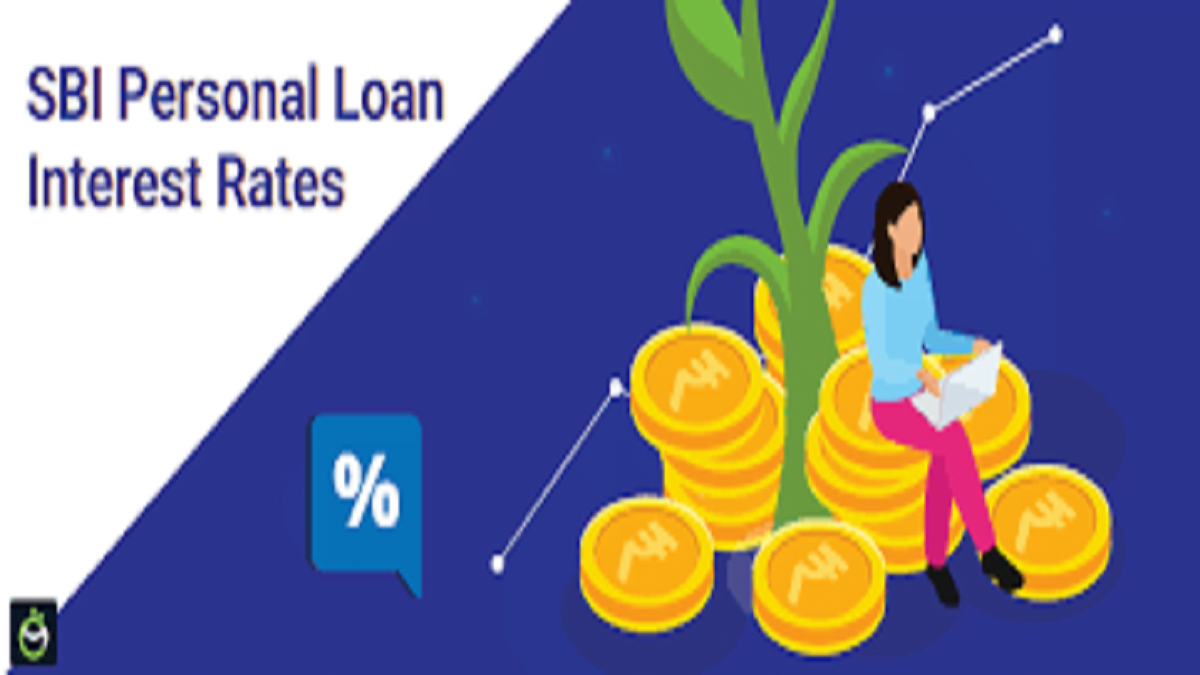SBI Personal Loan interest rate | Type Of interest rate
The interest rate for a personal loan from the State Bank of India (SBI) may vary based on several factors, such as the loan amount, repayment tenure, credit score, and income of the borrower.
SBI, or State Bank of India, is one of the largest public sector banks in India. It provides a wide range of financial products and services to its customers, including personal loans. SBI Personal Loans are a popular choice for many borrowers due to their attractive interest rates and flexible repayment options.
Interest Rate
The interest rate on SBI Personal Loans starts from 9.60% p.a. and can go up to 13.85% p.a. The actual rate of interest applicable to a borrower depends on various factors such as their credit score, loan amount, tenure, and other eligibility criteria.
Processing Fee
SBI charges a processing fee of up to 1% of the loan amount (minimum of Rs. 1,000 and maximum of Rs. 10,000) on its Personal Loans. This fee is deducted from the loan amount at the time of disbursal.
Repayment Tenure
SBI offers flexible repayment options to its borrowers. The repayment tenure can range from 12 months to 60 months. Borrowers can choose the repayment tenure that suits them best based on their financial situation.
Prepayment Charges
SBI allows borrowers to prepay their Personal Loans without any prepayment charges. This means that borrowers can make prepayments towards their loan and reduce the interest burden on their loan.
Eligibility Criteria
To be eligible for an SBI Personal Loan, a borrower must meet the following criteria:
- They must be an Indian citizen or resident
- They must be between 21 and 58 years of age
- They must have a minimum net monthly income of Rs. 15,000
- They must have a good credit score
Loan Amount
SBI Personal Loans can range from Rs. 10,000 to Rs. 20 lakhs, depending on the borrower’s eligibility. The loan amount is determined based on the borrower’s income, credit score, and other factors.
Collateral-free
SBI Personal Loans are unsecured loans, which means that borrowers do not have to provide any collateral or security to avail of the loan. This makes them an attractive option for borrowers who do not have any assets to pledge as collateral.
EMI Calculator
SBI provides an online EMI calculator on its website, which allows borrowers to calculate their monthly EMIs based on the loan amount, interest rate, and repayment tenure. This helps borrowers to plan their finances better and choose a loan amount and tenure that suits them best.
Online Application
SBI Personal Loans can be applied for online through the bank’s website. The process is quick and easy, and borrowers can track the status of their application online. Borrowers can also visit their nearest SBI branch to apply for a Personal Loan.
Interest Rate Reduction
SBI offers a 0.05% reduction in interest rates to borrowers who apply for a Personal Loan through the bank’s online portal. This is a good incentive for borrowers who prefer to apply for loans online.
In conclusion, SBI Personal Loans offer attractive interest rates, flexible repayment options, and a quick and easy application process. Borrowers can apply for a loan online or by visiting their nearest SBI branch. However, it is important to ensure that you meet the eligibility criteria and can afford the EMIs before applying for a Personal Loan.
SBI Personal Loan interest rate | Type Of interest rate
There are two main types of interest rates:
- Fixed Interest Rate: A fixed interest rate is a rate that remains the same throughout the loan tenure. This means that the borrower’s monthly payments will not change, regardless of changes in market conditions or the bank’s lending policies.
- Floating Interest Rate: A floating interest rate, also known as a variable interest rate, is a rate that fluctuates with changes in market conditions. This means that the borrower’s monthly payments may increase or decrease based on changes in market conditions or the bank’s lending policies.
In addition to these two main types, there are also other types of interest rates, such as:
- Reducing Balance Interest Rate: A reducing balance interest rate is a rate that is calculated on the outstanding loan balance at the end of each month. This means that as the borrower repays the loan, the interest charged decreases as well.
- Flat Interest Rate: A flat interest rate is a rate that is calculated on the original loan amount, regardless of how much of the loan has been repaid. This means that the borrower pays the same amount of interest throughout the loan tenure, regardless of how much they have repaid. Flat interest rates can be misleading and more expensive than reducing balance interest rates, as they do not take into account the decreasing balance of the loan.
SBI Personal Loan interest rate | Type Of interest rate
There are several types of interest rates
There are several types of interest rates, including:
- Nominal interest rate: This is the interest rate before adjusting for inflation. It is the stated interest rate on a loan or investment.
- Real interest rate: This is the nominal interest rate adjusted for inflation. It reflects the actual purchasing power of the money.
- Annual Percentage Rate (APR): This is the yearly interest rate that includes all fees and costs associated with a loan or investment.
- Effective interest rate: This is the actual interest rate earned or paid on a loan or investment over a period of time, taking into account compounding.
- Prime rate: This is the interest rate that banks charge their most creditworthy customers.
- Federal funds rate: This is the interest rate at which banks lend money to each other overnight. It is set by the Federal Reserve.
- LIBOR (London Interbank Offered Rate): This is the interest rate at which banks lend money to each other in the London market. It is used as a benchmark for many loans and investments.
- Discount rate: This is the interest rate at which banks can borrow money from the Federal Reserve. It is used to control the money supply and stabilize the economy.
- Fixed interest rate: This is an interest rate that remains constant over the life of a loan or investment.
- Variable interest rate: This is an interest rate that can change over time, based on fluctuations in the market or other factors.
- Compound interest rate: This is the interest rate that is calculated on the initial principal amount as well as on the interest earned in previous periods.
- Simple interest rate: This is the interest rate that is calculated only on the principal amount of a loan or investment.
- Floating interest rate: This is an interest rate that is tied to a benchmark rate, such as the LIBOR or the prime rate, and changes periodically based on changes in that benchmark rate.
- Risk premium: This is an additional amount of interest that lenders charge to compensate for the risk of default or other factors that increase the risk of lending.
- Opportunity cost: This is the cost of forgoing the opportunity to invest in another asset or project in order to invest in a particular loan or investment. It is often considered when calculating the appropriate interest rate for a particular investment.
- Inflationary expectations: This is the interest rate that is set based on expectations of future inflation rates. If there is an expectation that inflation will increase, then interest rates may be set higher to account for that.
- Mortgage interest rate: This is the interest rate that is charged on a mortgage loan, used to finance the purchase of a home.
- Student loan interest rate: This is the interest rate charged on student loans, which are used to finance education.
- Credit card interest rate: This is the interest rate charged on outstanding credit card balances, which can vary depending on the creditworthiness of the borrower and other factors.
- Peer-to-peer lending interest rate: This is the interest rate that is set by individual investors who lend money to borrowers through online platforms.
- Country-specific interest rates: Interest rates can vary by country, with some countries having higher or lower interest rates than others due to factors such as the strength of their economy, inflation rates, and government policies.
- Default interest rate: This is the interest rate that is charged when a borrower defaults on a loan or fails to make payments on time.
- Penalty interest rate: This is the interest rate that is charged as a penalty for late payment or other violations of the terms of a loan or investment.
- Minimum interest rate: This is the minimum amount of interest that must be paid on a loan or investment, regardless of any other factors.
- Maximum interest rate: This is the maximum amount of interest that can be charged on a loan or investment, as set by law or regulation.
- Preferred interest rate: This is a special interest rate that is offered to certain borrowers or investors, such as members of a credit union or preferred shareholders.
- Discounted interest rate: This is a reduced interest rate that is offered for a limited time or to certain borrowers or investors, as a promotional or incentive offer.
- Imputed interest rate: This is an interest rate that is deemed to exist for tax or accounting purposes, even if no interest is actually charged or paid. It is often used in situations where there is a non-cash exchange of assets, such as a barter transaction or the transfer of property between family members.
SBI Personal Loan interest rate | Type Of interest rate
It is important to understand the type of interest rate being offered by the bank before taking out a loan to ensure that the borrower can afford the monthly payments and make an informed decision.
SBI Personal Loan interest rate | Type Of interest rate
SBI Personal Loan interest rate | Type Of interest rate
SBI Personal Loan interest rate | Type Of interest rate
SBI Personal Loan interest rate | Type Of interest rate
SBI Personal Loan interest rate | Type Of interest rate
SBI Personal Loan interest rate | Type Of interest rate
SBI Personal Loan interest rate | Type Of interest rate
SBI Personal Loan interest rate | Type Of interest rate
SBI Personal Loan interest rate | Type Of interest rate
SBI Personal Loan interest rate | Type Of interest rate
SBI Personal Loan interest rate | Type Of interest rate
SBI Personal Loan interest rate | Type Of interest rate
SBI Personal Loan interest rate | Type Of interest rate
SBI Personal Loan interest rate | Type Of interest rate
SBI Personal Loan interest rate | Type Of interest rate
SBI Personal Loan interest rate | Type Of interest rate
SBI Personal Loan interest rate | Type Of interest rate
SBI Personal Loan interest rate | Type Of interest rate













